The top private schools in the UK in 2026

Are you considering a private (independent) school for your child's secondary education?
With more than 1,500 private senior schools across the UK – including around 500 boarding schools – knowing where to start can feel overwhelming. The good news: you don’t have to navigate it alone. We’ll guide you through the key things to know so you can make confident, informed choices.
Here’s what you’ll find in this guide:
- The 100 highest-performing private schools in England in 2026
- The difference between private and public schools
- Fees and financial support available at the top 10 private schools
What are private schools?
Private schools – often called independent schools – are fee-paying. Unlike state schools, which are free to attend, independent schools charge fees directly. These are usually charged termly, so most parents make three payments across the academic year.
Private schools are independent of the state, so you apply directly to each school. If you’re also considering state schools, you’ll still need to complete your local authority’s secondary school application form for those options.
Some private schools (especially the most competitive ones) are selective. Your child might need to meet specific academic criteria, such as passing an entrance exam, to be considered for a place.
Admissions timelines vary between schools. If you’re looking at 11+ entry into Year 7, most senior schools close registrations in October or November of Year 6, though some set earlier deadlines in the summer term of Year 5. Entrance exams usually take place in December or January.
£100 off your Atom Home subscription
You have the chance to win £100 off your Atom Home subscription when you sign up to our newsletter.

How much do private schools cost?
The fees for private senior schools vary depending on the school, its location, and whether it offers boarding. As these schools receive more private funding, they are usually able to offer better facilities and a wider range of extracurricular activities (e.g. in sports, creative arts and outdoor pursuits) for their students.
The majority of private schools in England are able to offer financial assistance. The most common type of assistance, known as a bursary, is means-tested and usually available to children who pass the entrance process and whose parents would not otherwise be able to afford the school fees. According to the Independent Schools Council (ISC), which represents over 1,300 of the best-ranked UK and international schools, a total of £547 million per year is currently offered in fee assistance through bursaries.
Why are private schools in England sometimes called public schools?
As the terms private and public have entirely opposite meanings, it can be confusing when you hear some private schools being referred to as ‘public schools’.
In the UK, ‘public school’ is an archaic term used for an elite group of fee-paying schools. The term first emerged in the 18th century when a small group of well-established boys’ schools distinguished themselves from the spread of grammar schools (which were free) by charging fees. These schools were Eton College, Shrewsbury School, Harrow School, Charterhouse School, Rugby School, Westminster School and Winchester College.
‘Public school’ is now considered an outdated term in the UK, with fee-paying schools now typically referred to as ‘private schools’ or 'independent schools’.
What is the average class size in UK private schools?
UK private schools are renowned for having smaller class sizes than their state school counterparts. While state schools will often have around 30-32 pupils in a class, private schools have a much lower pupil-to-teacher ratio.
In Key Stage 3 (Year 7 to 9), there are around 20 (normally no more than 25) pupils per class in UK private schools. As pupils move from year to year, class sizes tend to become smaller as a result of ‘streaming’ (setting classes based on academic ability) and more subject choices to choose from at GCSE and A level. Sixth form classes are typically much smaller, with around 8 to 15 students in a class.
The top 100 private schools in UK in 2026
The following schools were ranked the best in the country by The Times based on their A level (or equivalent) and GCSE results in 2025.
1. St Paul’s School (London)
- A level results: 98.2% A*–B
- GCSE results: 97.6% A*/A/9/8/7
- Entry gender: boys
2. Brighton College (Brighton)
- A level results: 97.9% A*–B
- GCSE results: 98% A*/A/9/8/7
- Entry gender: mixed
3. North London Collegiate School (London)
- A level results: 96.6% A*–B
- GCSE results: 99.2% A*/A/9/8/7
- Entry gender: girls
4. Godolphin and Latymer School (London)
- A level results: 97.5% A*–B
- GCSE results: 96.9% A*/A/9/8/7
- Entry gender: girls
5. Guildford High School (Guildford)
- A level results: 97.3% A*–B
- GCSE results: 96.7% A*/A/9/8/7
- Entry gender: girls
6. St Paul’s Girls’ School (London)
- A level results: 95.6% A*–B
- GCSE results: 99.5% A*/A/9/8/7
- Entry gender: girls
7. King’s College School, Wimbledon (London)
- A level results: 96.2% A*–B
- GCSE results: 98.2% A*/A/9/8/7
- Entry gender: boys, mixed sixth form
8. Westminster School (London)
- A level results: 96.3% A*–B
- GCSE results: 97.6% A*/A/9/8/7
- Entry gender: boys, mixed sixth form
9. City of London School for Girls (London)
- A level results: 95.7% A*–B
- GCSE results: 95.4% A*/A/9/8/7
- Entry gender: girls
10. Latymer Upper School (London)
- A level results: 95.1% A*–B
- GCSE results: 96.5% A*/A/9/8/7
- Entry gender: mixed
11. King Edward VI High School for Girls (Birmingham)
- A level results: 94.9% A*–B
- GCSE results: 96.6% A*/A/9/8/7
- Entry gender: girls
12. Lady Eleanor Holles (London)
- A level results: 95.9% A*–B
- GCSE results: 93.6% A*/A/9/8/7
- Entry gender: girls
13. Alleyn’s School (London)
- A level results: 94.7% A*–B
- GCSE results: 94.8% A*/A/9/8/7
- Entry gender: mixed
14. Eton College (Windsor)
- A level results: 95% A*–B
- GCSE results: 94% A*/A/9/8/7
- Entry gender: boys
15. Sevenoaks School (Sevenoaks)
- A level results: 97.4% A*–B
- GCSE results: 88.7% A*/A/9/8/7
- Entry gender: mixed
16. South Hampstead High School GDST (London)
- A level results: 95.2% A*–B
- GCSE results: 92.2% A*/A/9/8/7
- Entry gender: girls
17. City of London School (London)
- A level results: 93.2% A*–B
- GCSE results: 95.5% A*/A/9/8/7
- Entry gender: boys
18. Wycombe Abbey (High Wycombe)
- A level results: 92.4% A*–B
- GCSE results: 96.7% A*/A/9/8/7
- Entry gender: girls
19. Highgate School (London)
- A level results: 92.7% A*–B
- GCSE results: 95.7% A*/A/9/8/7
- Entry gender: mixed
20. Magdalen College School (Oxford)
- A level results: 93.2% A*–B
- GCSE results: 94.1% A*/A/9/8/7
- Entry gender: boys, mixed sixth form
21. Queen Ethelburga’s College (York)
- A level results: 94.5% A*–B
- GCSE results: 90.3% A*/A/9/8/7
- Entry gender: mixed
22. Royal Grammar School, Guildford (Guildford)
- A level results: 95.2% A*–B
- GCSE results: 88.6% A*/A/9/8/7
- Entry gender: boys
23=. Putney High School GDST (London)
- A level results: 93.4% A*–B
- GCSE results: 91.8% A*/A/9/8/7
- Entry gender: girls
23=. Hampton School (London)
- A level results: 91.5% A*–B
- GCSE results: 95.8% A*/A/9/8/7
- Entry gender: boys
25. University College School (London)
- A level results: 93.6% A*–B
- GCSE results: 91.3% A*/A/9/8/7
- Entry gender: boys, mixed sixth form
26=. Winchester College (Winchester)
- A level results: 92.4% A*–B
- GCSE results: 93.5% A*/A/9/8/7
- Entry gender: boys, mixed sixth form
26=. The Perse School (Cambridge)
- A level results: 93.9% A*–B
- GCSE results: 90.4% A*/A/9/8/7
- Entry gender: mixed
28. Tonbridge School (Tonbridge)
- A level results: 92.5% A*–B
- GCSE results: 92.6% A*/A/9/8/7
- Entry gender: boys
29. Reigate Grammar School (Reigate)
- A level results: 93.9% A*–B
- GCSE results: 89.7% A*/A/9/8/7
- Entry gender: mixed
30. Kingston Grammar School (Kingston upon Thames)
- A level results: 92.7% A*–B
- GCSE results: 91.6% A*/A/9/8/7
- Entry gender: mixed
31. Concord College (Shrewsbury)
- A level results: 95.3% A*–B
- GCSE results: 86.2% A*/A/9/8/7
- Entry gender: mixed
32. Trinity School, Croydon (Croydon)
- A level results: 95% A*–B
- GCSE results: 86.1% A*/A/9/8/7
- Entry gender: boys, mixed sixth form
33. James Allen’s Girls’ School (London)
- A level results: 92.7% A*–B
- GCSE results: 90.7% A*/A/9/8/7
- Entry gender: girls
34. Notting Hill and Ealing High School GDST (London)
- A level results: 91.4% A*–B
- GCSE results: 93.1% A*/A/9/8/7
- Entry gender: girls
35. Withington Girls’ School (Manchester)
- A level results: 91.3% A*–B
- GCSE results: 92.9% A*/A/9/8/7
- Entry gender: girls
36. Wimbledon High School GDST (London)
- A level results: 94.6% A*–B
- GCSE results: 85.9% A*/A/9/8/7
- Entry gender: girls
37. Bancroft’s (Woodford Green)
- A level results: 93.2% A*–B
- GCSE results: 88.3% A*/A/9/8/7
- Entry gender: mixed
38=. Caterham School (Caterham)
- A level results: 91.4% A*–B
- GCSE results: 91.5% A*/A/9/8/7
- Entry gender: mixed
38=. The Manchester Grammar School (Manchester)
- A level results: 93% A*–B
- GCSE results: 88.2% A*/A/9/8/7
- Entry gender: boys
40. Cardiff Sixth Form College (Cardiff)
- A level results: 99.6% A*–B
- GCSE results: 74.8% A*/A/9/8/7
- Entry gender: mixed
41. King Edward’s School, Birmingham (Birmingham)
- A level results: 94.8% A*–B
- GCSE results: 83.8% A*/A/9/8/7
- Entry gender: boys
42. Emanuel School (London)
- A level results: 91.3% A*–B
- GCSE results: 90.9% A*/A/9/8/7
- Entry gender: mixed
43=. Oxford High School GDST (Oxford)
- A level results: 89.3% A*–B
- GCSE results: 93.6% A*/A/9/8/7
- Entry gender: girls
43=. Eltham College (London)
- A level results: 91.9% A*–B
- GCSE results: 88.5% A*/A/9/8/7
- Entry gender: mixed
45. Channing School (London)
- A level results: 95.1% A*–B
- GCSE results: 81.7% A*/A/9/8/7
- Entry gender: girls
46. Dulwich College (London)
- A level results: 89.1% A*–B
- GCSE results: 93.5% A*/A/9/8/7
- Entry gender: boys
47. Colfe’s School (London)
- A level results: 95.3% A*–B
- GCSE results: 80.1% A*/A/9/8/7
- Entry gender: mixed
48. Wellington College (Crowthorne)
- A level results: 91.6% A*–B
- GCSE results: 86.7% A*/A/9/8/7
- Entry gender: mixed
49. Nottingham High School (Nottingham)
- A level results: 92.4% A*–B
- GCSE results: 84.9% A*/A/9/8/7
- Entry gender: mixed
50. Surbiton High School (Kingston upon Thames)
- A level results: 91.8% A*–B
- GCSE results: 85.5% A*/A/9/8/7
- Entry gender: girls
51. St Albans High School for Girls (St Albans)
- A level results: 92% A*–B
- GCSE results: 85% A*/A/9/8/7
- Entry gender: girls
52. Epsom College (Epsom)
- A level results: 90.6% A*–B
- GCSE results: 87.1% A*/A/9/8/7
- Entry gender: mixed
53. Whitgift School (South Croydon)
- A level results: 90.1% A*–B
- GCSE results: 87.2% A*/A/9/8/7
- Entry gender: boys
54. St Helen and St Katharine (Abingdon)
- A level results: 87.5% A*–B
- GCSE results: 92.1% A*/A/9/8/7
- Entry gender: girls
55. Merchant Taylors’ School, Northwood (London)
- A level results: 89.3% A*–B
- GCSE results: 88.3% A*/A/9/8/7
- Entry gender: boys
56. Westbourne School (Penarth)
- A level results: 96.5% A*–B
- GCSE results: 73.1% A*/A/9/8/7
- Entry gender: mixed
57. City of London Freemen’s School (Ashtead)
- A level results: 92.2% A*–B
- GCSE results: 81.5% A*/A/9/8/7
- Entry gender: mixed
58. St Michael’s School (Llanelli)
- A level results: 93.5% A*–B
- GCSE results: 78.7% A*/A/9/8/7
- Entry gender: mixed
59. Francis Holland School, Sloane Square (London)
- A level results: 89% A*–B
- GCSE results: 87% A*/A/9/8/7
- Entry gender: girls
60. Abingdon School (Abingdon)
- A level results: 88.9% A*–B
- GCSE results: 87.1% A*/A/9/8/7
- Entry gender: mixed
61. St Mary’s School Ascot (Ascot)
- A level results: 84.7% A*–B
- GCSE results: 94.1% A*/A/9/8/7
- Entry gender: girls
62. Cheltenham Ladies’ College (Cheltenham)
- A level results: 87.3% A*–B
- GCSE results: 87.6% A*/A/9/8/7
- Entry gender: girls
63. Harrow School (Harrow on the Hill)
- A level results: 88.6% A*–B
- GCSE results: 84.3% A*/A/9/8/7
- Entry gender: boys
64. St Catherine’s, Bramley (Guildford)
- A level results: 90.8% A*–B
- GCSE results: 79.6% A*/A/9/8/7
- Entry gender: girls
65. St Swithun’s School (Winchester)
- A level results: 91.8% A*–B
- GCSE results: 77.4% A*/A/9/8/7
- Entry gender: girls
66. Radley College (Abingdon)
- A level results: 86.6% A*–B
- GCSE results: 86.5% A*/A/9/8/7
- Entry gender: boys
67. The Leys (Cambridge)
- A level results: 85.7% A*–B
- GCSE results: 86.1% A*/A/9/8/7
- Entry gender: mixed
68. Sir William Perkins’s School (Chertsey)
- A level results: 86.1% A*–B
- GCSE results: 85% A*/A/9/8/7
- Entry gender: girls
69. Sheffield Girls’ GDST (Sheffield)
- A level results: 87.9% A*–B
- GCSE results: 80.2% A*/A/9/8/7
- Entry gender: girls
70. King Edward’s School, Bath (Bath)
- A level results: 89.7% A*–B
- GCSE results: 76.6% A*/A/9/8/7
- Entry gender: mixed
71. St Dunstan’s College (London)
- A level results: 89.5% A*–B
- GCSE results: 76.7% A*/A/9/8/7
- Entry gender: mixed
72. Ibstock Place School (London)
- A level results: 86% A*–B
- GCSE results: 83.4% A*/A/9/8/7
- Entry gender: mixed
73=. Churcher’s College (Petersfield)
- A level results: 90.7% A*–B
- GCSE results: 73.6% A*/A/9/8/7
- Entry gender: mixed
73=. Hurstpierpoint College (Hassocks)
- A level results: 88% A*–B
- GCSE results: 79% A*/A/9/8/7
- Entry gender: mixed
75. St John’s College, Cardiff (Cardiff)
- A level results: 87.3% A*–B
- GCSE results: 80.2% A*/A/9/8/7
- Entry gender: mixed
76. Benenden School (Cranbrook)
- A level results: 87.9% A*–B
- GCSE results: 78.2% A*/A/9/8/7
- Entry gender: girls
77=. Haileybury (Hertford)
- A level results: 85.8% A*–B
- GCSE results: 82.4% A*/A/9/8/7
- Entry gender: mixed
77=. Harrodian (London)
- A level results: 88.4% A*–B
- GCSE results: 77.1% A*/A/9/8/7
- Entry gender: mixed
79. The King’s School, Chester (Chester)
- A level results: 84.8% A*–B
- GCSE results: 83.6% A*/A/9/8/7
- Entry gender: mixed
80. Queen’s College, London (London)
- A level results: 86.2% A*–B
- GCSE results: 80.8% A*/A/9/8/7
- Entry gender: girls
81=. Francis Holland School, Regent’s Park (London)
- A level results: 87% A*–B
- GCSE results: 79% A*/A/9/8/7
- Entry gender: girls
81=. Royal Grammar School, Newcastle (Newcastle upon Tyne)
- A level results: 86.3% A*–B
- GCSE results: 80.3% A*/A/9/8/7
- Entry gender: mixed
83. Oundle School (Peterborough)
- A level results: 87.5% A*–B
- GCSE results: 77.6% A*/A/9/8/7
- Entry gender: mixed
84. St Helen’s School, Northwood (London)
- A level results: 85.9% A*–B
- GCSE results: 80.4% A*/A/9/8/7
- Entry gender: girls
85. St Augustine’s Priory (London)
- A level results: 93.5% A*–B
- GCSE results: 64.2% A*/A/9/8/7
- Entry gender: girls
86. Redmaids’ High School (Bristol)
- A level results: 88.6% A*–B
- GCSE results: 73.1% A*/A/9/8/7
- Entry gender: girls
87. St Albans School (St Albans)
- A level results: 84.6% A*–B
- GCSE results: 80.4% A*/A/9/8/7
- Entry gender: boys, mixed sixth form
88. The Cathedral School, Llandaff (Cardiff)
- A level results: 89.8% A*–B
- GCSE results: 69.9% A*/A/9/8/7
- Entry gender: mixed
89=. Reading Blue Coat (Sonning-on-Thames)
- A level results: 83.4% A*–B
- GCSE results: 81.9% A*/A/9/8/7
- Entry gender: boys, mixed sixth form
89=. Immanuel College (Bushey)
- A level results: 88.4% A*–B
- GCSE results: 71.9% A*/A/9/8/7
- Entry gender: mixed
91. Manchester High School for Girls (Manchester)
- A level results: 85.9% A*–B
- GCSE results: 76.9% A*/A/9/8/7
- Entry gender: girls
92. The Abbey (Reading)
- A level results: 83.9% A*–B
- GCSE results: 80.8% A*/A/9/8/7
- Entry gender: girls
93=. Solihull School (Solihull)
- A level results: 84.4% A*–B
- GCSE results: 78.8% A*/A/9/8/7
- Entry gender: mixed
93=. The Maynard School (Exeter)
- A level results: 86.1% A*–B
- GCSE results: 75.4% A*/A/9/8/7
- Entry gender: girls
95. Downe House (Thatcham)
- A level results: 83% A*–B
- GCSE results: 81% A*/A/9/8/7
- Entry gender: girls
96. Bedford School (Bedford)
- A level results: 86.3% A*–B
- GCSE results: 74.1% A*/A/9/8/7
- Entry gender: boys
97. The Grammar School at Leeds (Leeds)
- A level results: 87.4% A*–B
- GCSE results: 71.1% A*/A/9/8/7
- Entry gender: mixed
98. Leicester Grammar School (Leicester)
- A level results: 85.8% A*–B
- GCSE results: 74.2% A*/A/9/8/7
- Entry gender: mixed
99. Croydon High School GDST (South Croydon)
- A level results: 84% A*–B
- GCSE results: 77.5% A*/A/9/8/7
- Entry gender: girls
100. Reed's School (Surrey)
- A level results: 85% A*–B
- GCSE results: 75% A*/A/9/8/7
- Entry gender: boys, mixed sixth form
The top 10 private schools in detail
1. St Paul's School
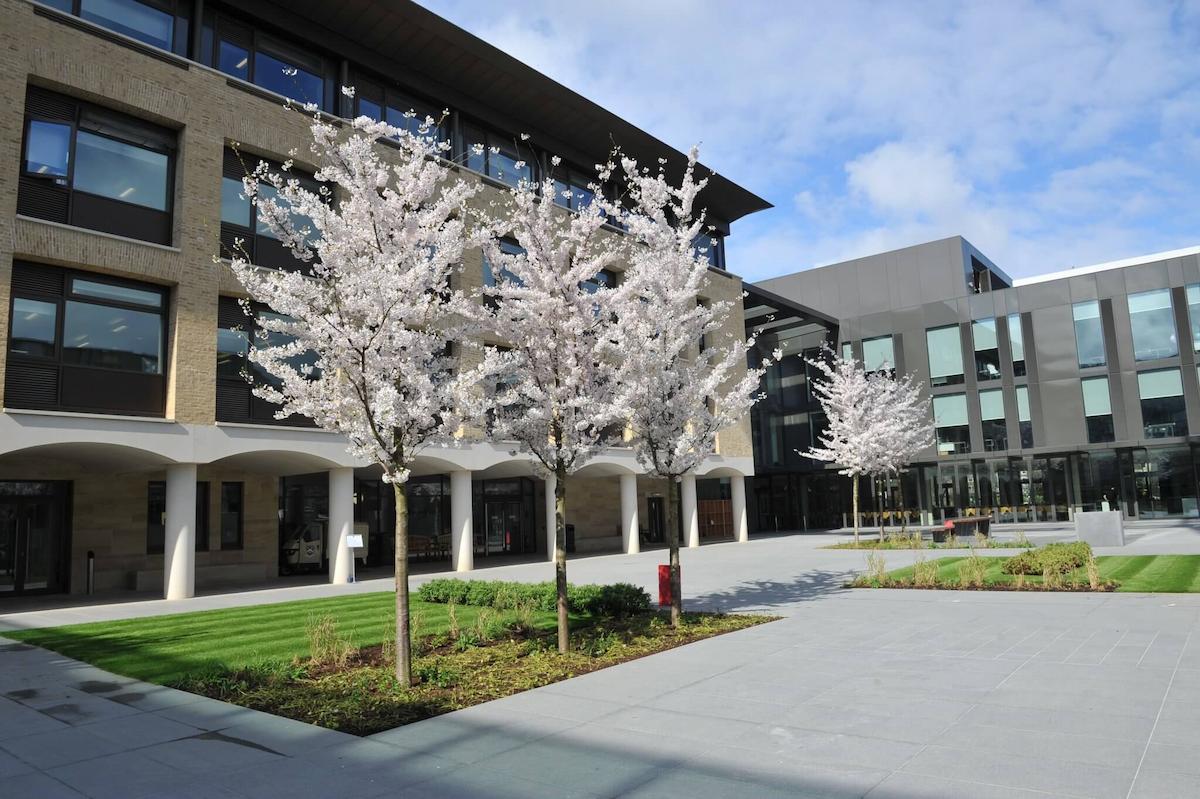
St Paul’s School is a boys’ independent day and boarding school located on a 43-acre site in Barnes, West London. It was founded in 1509 by John Colet, Dean of St Paul’s Cathedral. Boys at St Paul’s School are known as ‘Paulines’.
In 2025, 38 boys from St Paul's went on to study at Oxford and Cambridge universities, and 33 boys were offered places at universities in North America.
St Paul's School fees
St Paul's School fees for 2025–2026 are £11,949 per term for day pupils, and £17,981 for boarders. The school offers a bursary programme (known as the Founder's Awards) for lower-income families, ranging from 5% to 100% of fees. St Paul’s School also offers academic scholarships and sports awards.
2. Brighton College
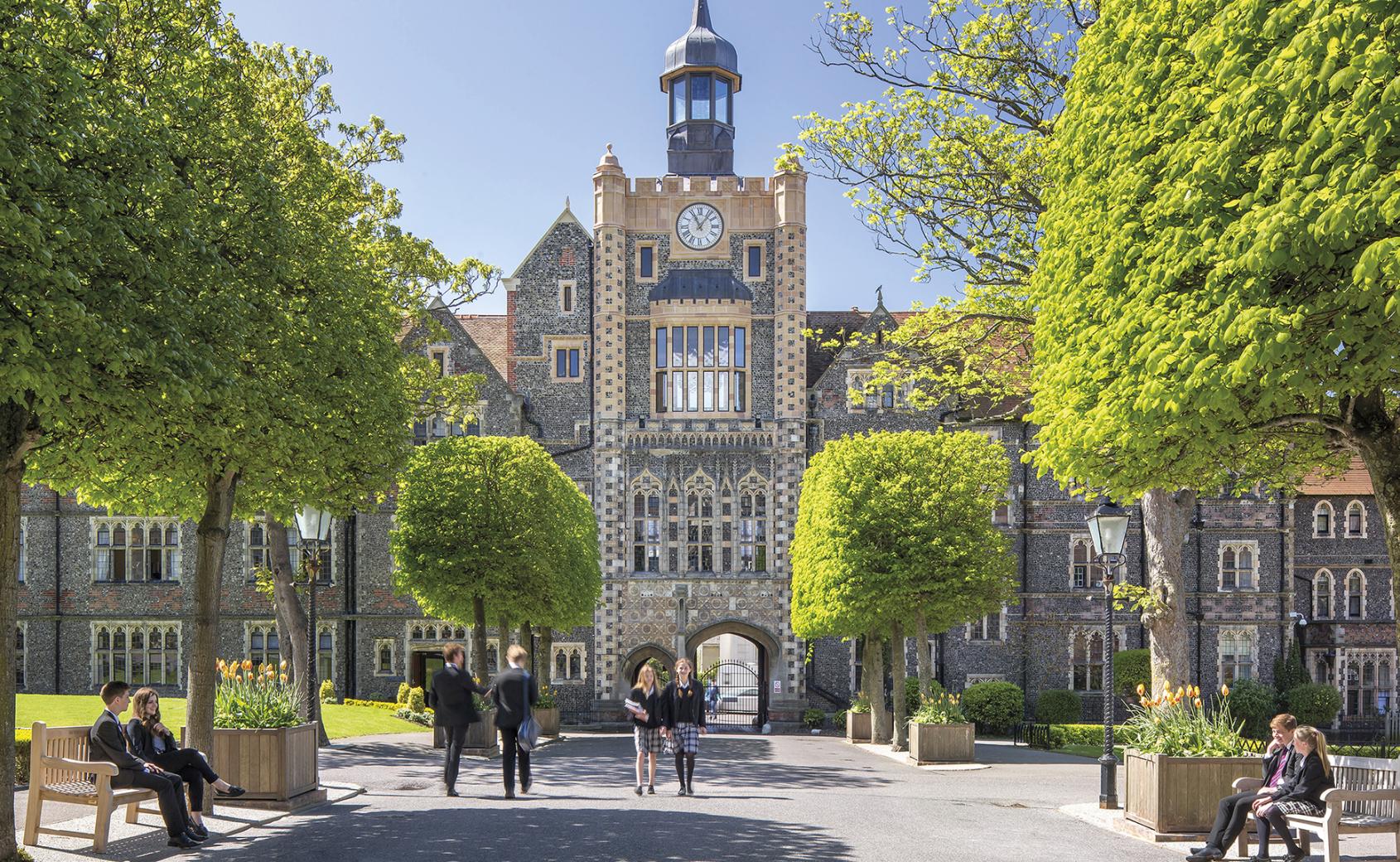
Brighton College is a prestigious co-educational day and boarding school in Brighton, East Sussex. Founded in 1845, it has a long-standing reputation for academic excellence and innovation.
The school was named The Sunday Times Parent Power School of the Decade and, in 2025, was awarded Independent Boarding School of the Year, Independent School of the Year for A-levels and Independent School of the Year for Academic Excellence in the Southeast.
Brighton College fees
The 2025–2026 fees at Brighton College range from £8,000 to £10,970 per term for day pupils (including lunch) and £15,290 to £19,140 per term for boarders.
Brighton College offers a range of scholarships and bursaries to support eligible families. These include academic, music, and sports scholarships, as well as means-tested bursaries that can cover up to 100% of tuition fees.
3. North London Collegiate School
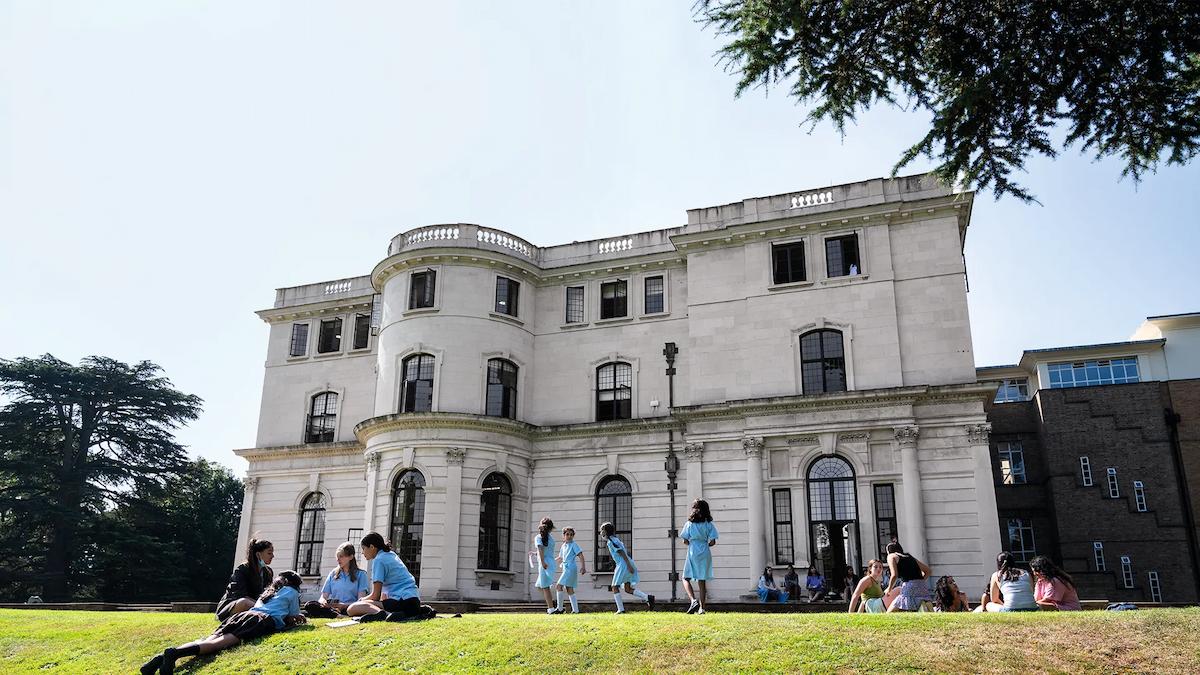
North London Collegiate School is an independent day school for girls aged 4–18. It was founded in 1850 by Frances Buss – a pioneer in girls’ education – as the first school in the UK to offer girls the same educational opportunities as boys. It occupies a Georgian mansion on a 30-acre site in Edgware, North West London.
North London Collegiate School fees
The 2025-2026 fees at North London Collegiate School are £9,917 per term. Means-tested bursaries of up to 100% fee remission are available for 11 plus and 16 plus candidates.
Scholarships are available, including the Handel music scholarship and the Sophie Bryant scholarship.
4. Godolphin and Latymer
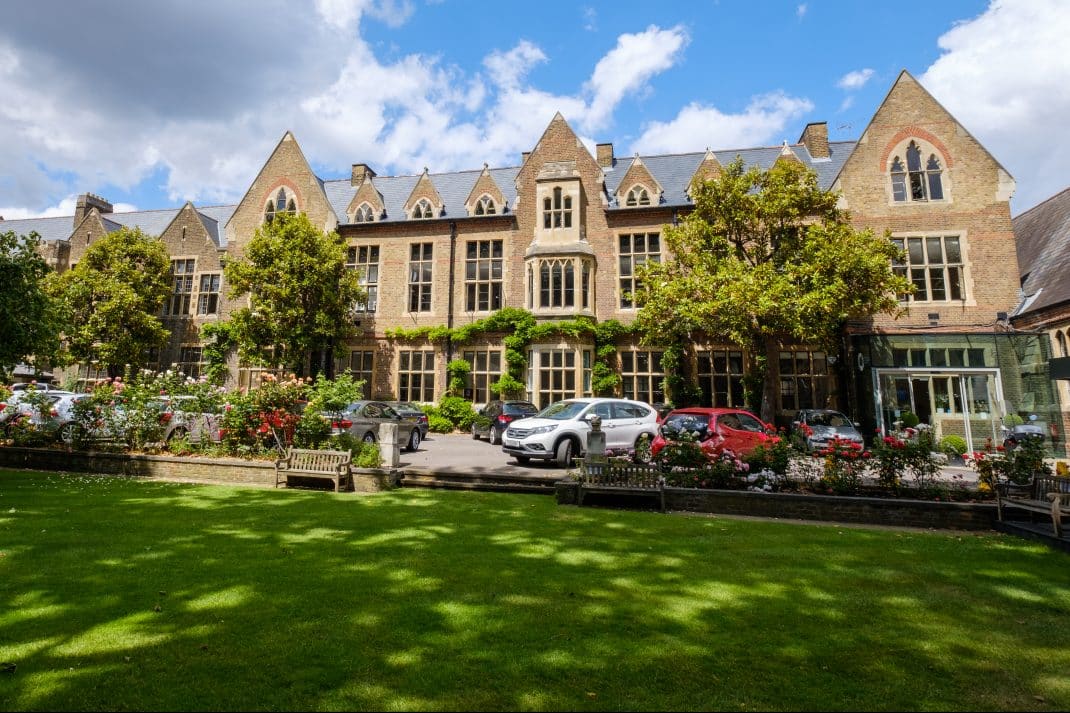
Godolphin and Latymer School is an independent day school for girls in Hammersmith, West London. Founded in 1905, the school has a longstanding reputation for academic excellence and offers a broad curriculum, including both A-levels and the International Baccalaureate (IB) in the sixth form.
Godolphin and Latymer School fees
The termly fees at Godolphin and Latymer School for 2025-2026 are £11,226-£11,698. The school provides means-tested bursaries ranging from 10% to 100%. Music and art scholarships are available at 11+ and 16+ entry, offering up to 30% of school fees.
5. Guildford High School
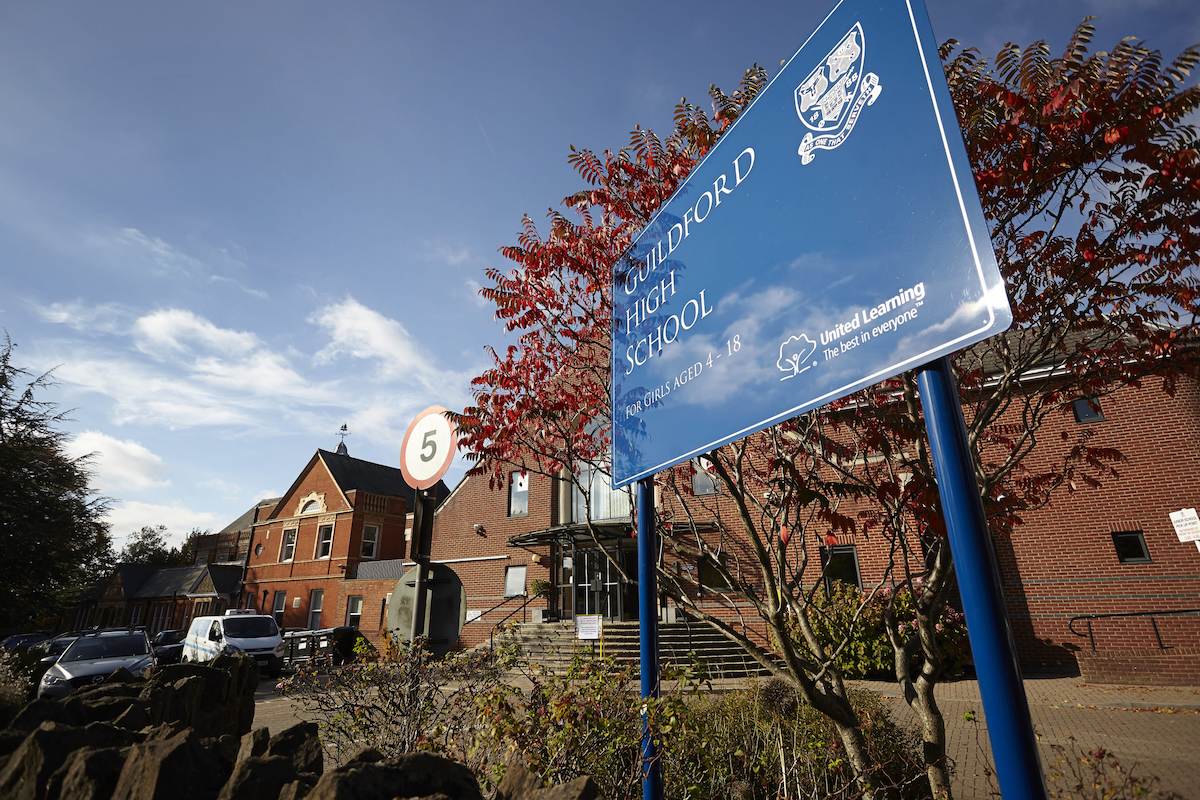
Guildford High School is an independent day school for girls aged 4–18. The school offers an extensive co-curricular programme, with more than 70 clubs running each week, and has placed a strong emphasis on sustainability in recent years. In 2023, it was awarded the Eco-Schools Green Flag with Distinction for its environmental initiatives.
Guildford High School fees
Guildford High School’s fees are £8,663 per term in 2025-2026. The school offers a sibling discount of 5% (and 10% for subsequent daughters) and means-tested bursaries to eligible families. Scholarships are available to internal and external candidates and provide fee remission of between 5% and 10%.
6. St Paul's Girls' School
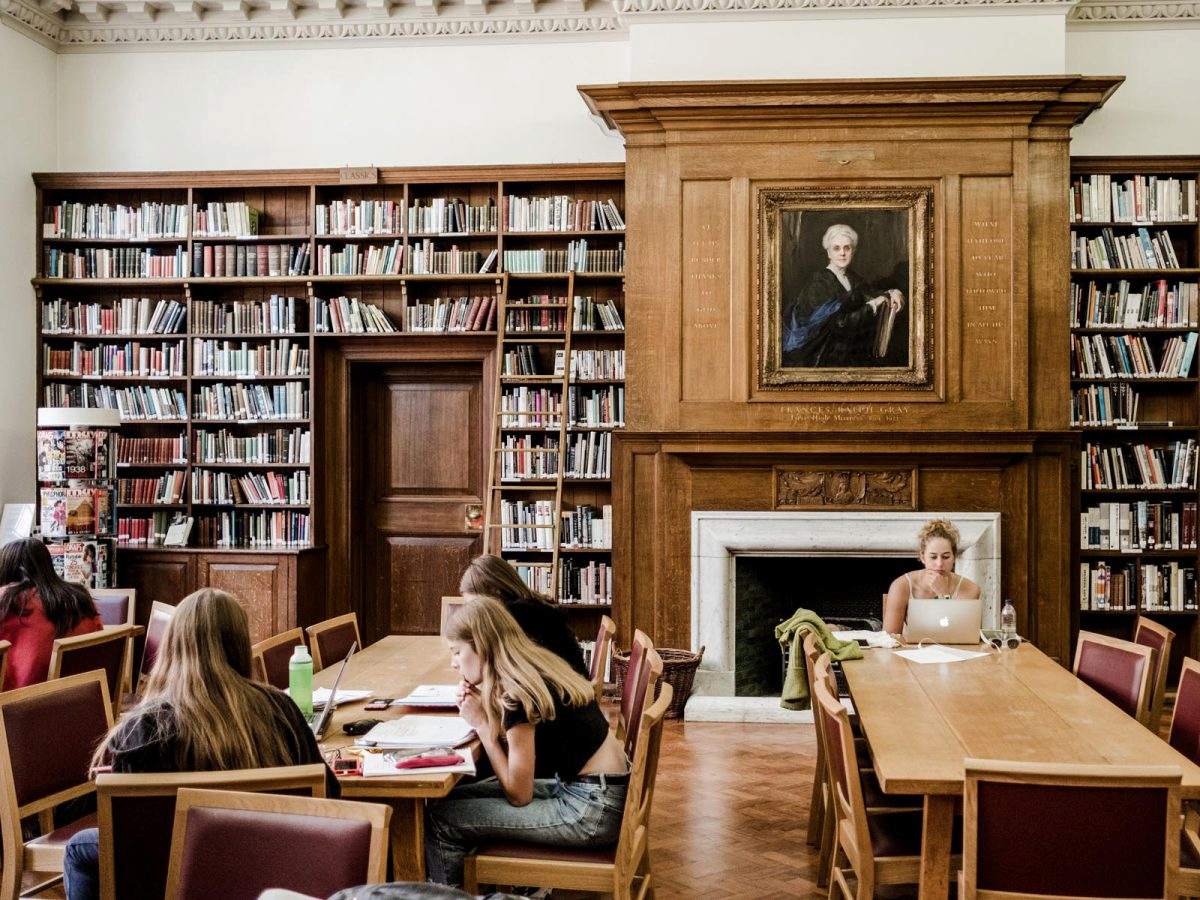
St Paul’s Girls’ School in Hammersmith, West London is frequently among the top 10 independent schools in the UK. It was founded in 1904 to complement St Paul’s School (the boys’ counterpart).
Students are known as ‘Paulinas’. There are approximately 20 students per class in the Lower School at St Paul’s Girls’ School.
St Paul's Girls' School fees
St Paul's Girls' School's fees for 2025-2026 range from £12,414 to £13,409 per term, which includes lunch. The school offers music scholarships for 11 plus applicants and has a means-tested bursary programme available to families with a total gross household income of less than £140k.
7. King's College School Wimbledon
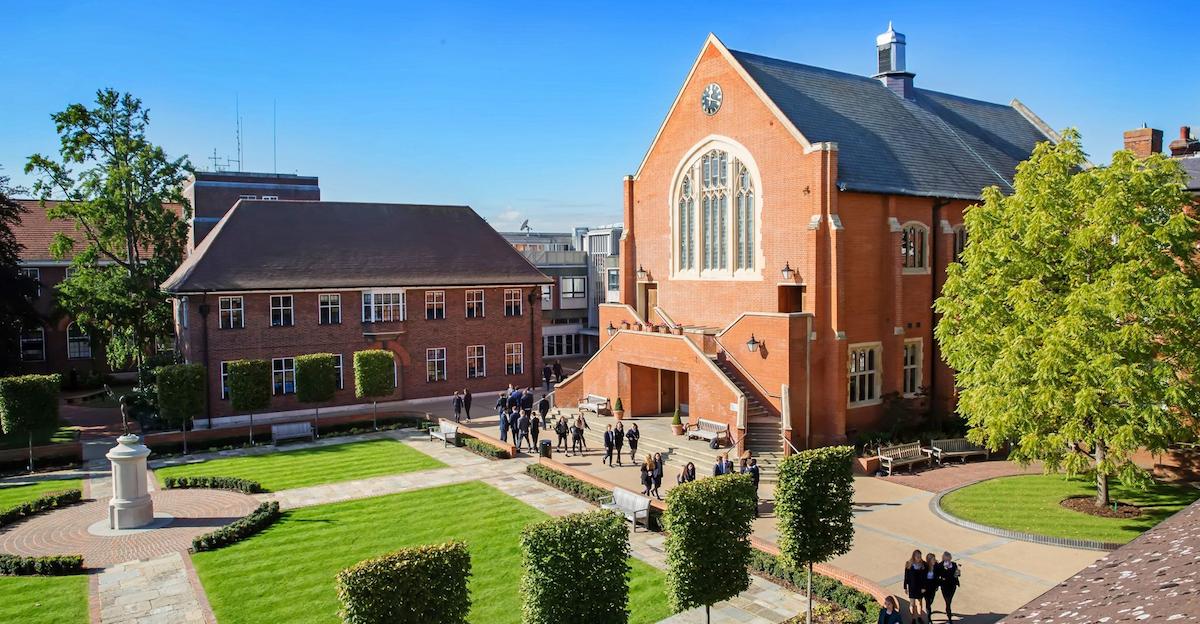
King’s College School Wimbledon is a prestigious boys’ day school on the edge of Wimbledon Common in South West London. Girls are accepted into the sixth form. The school was founded by royal charter in 1829 as the junior department of King’s College London on the Strand, before moving to Wimbledon in 1897.
King's College School Wimbledon fees
King's College School fees for 2025-2026 are £10,410-£11,404 per term. The school offers bursaries of up to 100% off tuition fees to eligible families as well as academic, music and sports scholarships.
8. Westminster School
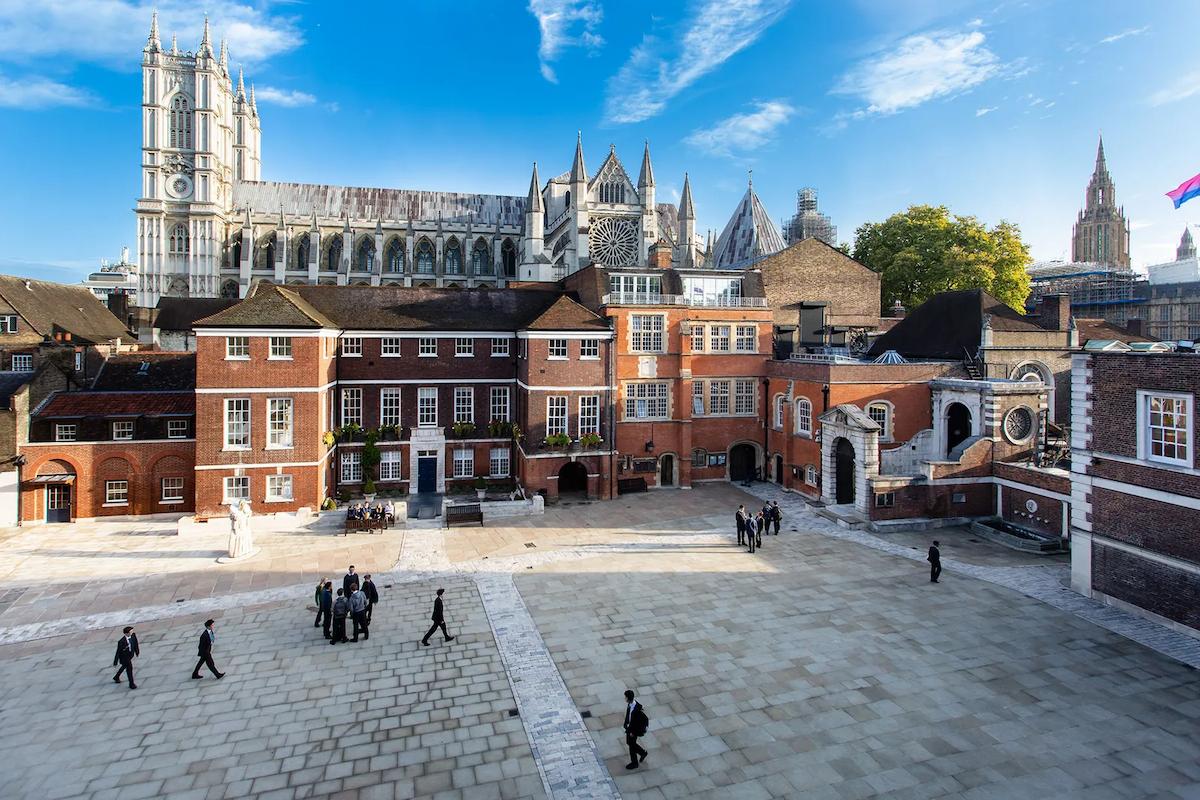
Westminster School is an independent day and boarding school for boys (and girls in the sixth form) in Little Dean’s Yard in the precincts of Westminster Abbey. The school has a long-established reputation for academic excellence, and many sixth-form leavers progress to highly selective universities, including Oxford and Cambridge.
Westminster School fees
Westminster School fees for 2025-2026 are £15,451 to £16,650 per term for day pupils and £21,992 per term for boarders. A bursary programme is in place, with awards ranging from 5% to 100% fee remission. Academic and music scholarships are also available, including awards for specialist talents such as the Henry Purcell organ scholarship.
9. City of London School for Girls
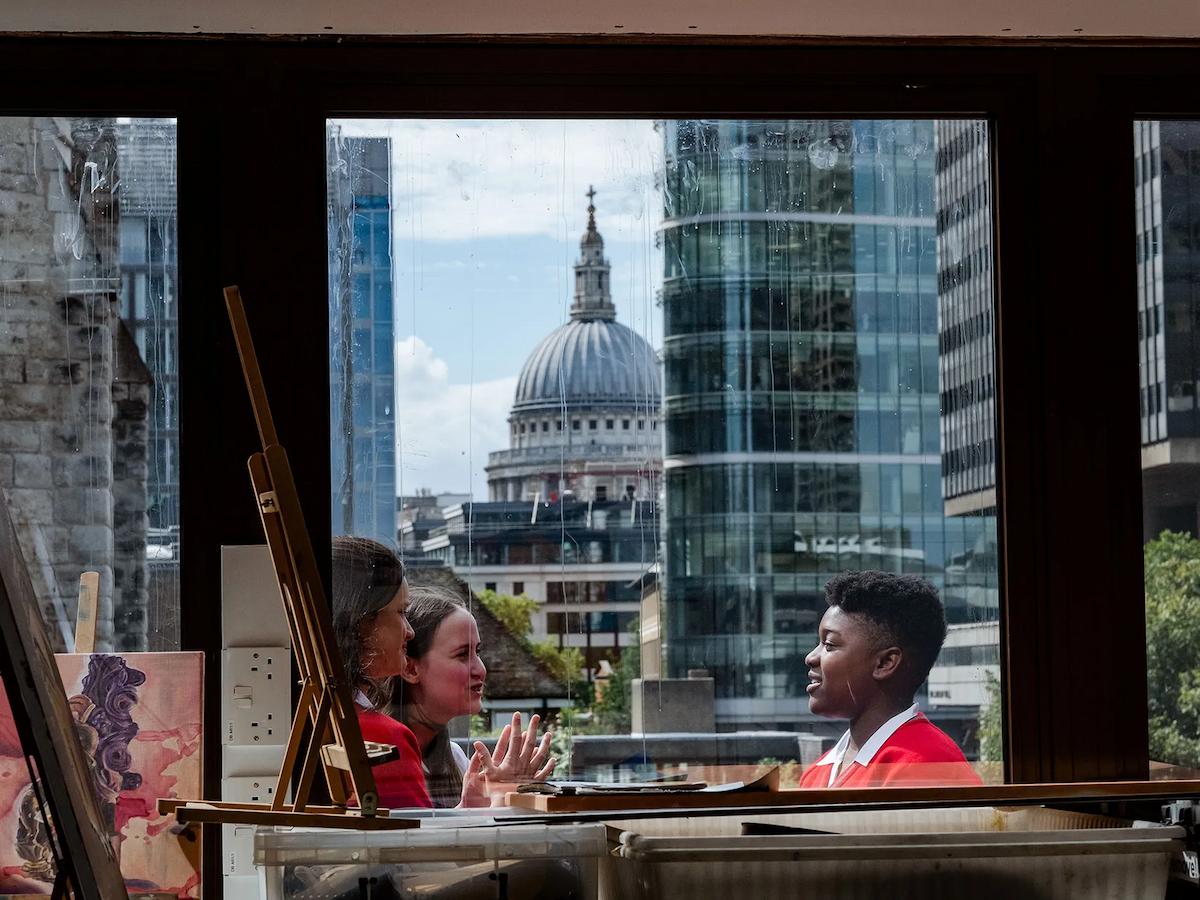
City of London School for Girls is an independent day school for girls aged 7–18 in the heart of Central London. The school describes itself as 'intellectually edgy, unassuming and unpretentious'. A unique coaching programme supports girls to become confident young women by developing inner strength, social and emotional intelligence, positivity and integrity.
City of London School for Girls' fees
The 2025-2026 fees for City of London School for Girls are £10,082 per term. A capped number of means-tested bursaries (usually 12–15 at 11+ entry) are available. The school also offers 11+ music scholarships worth up to 10% fee remission.
10. Latymer Upper School
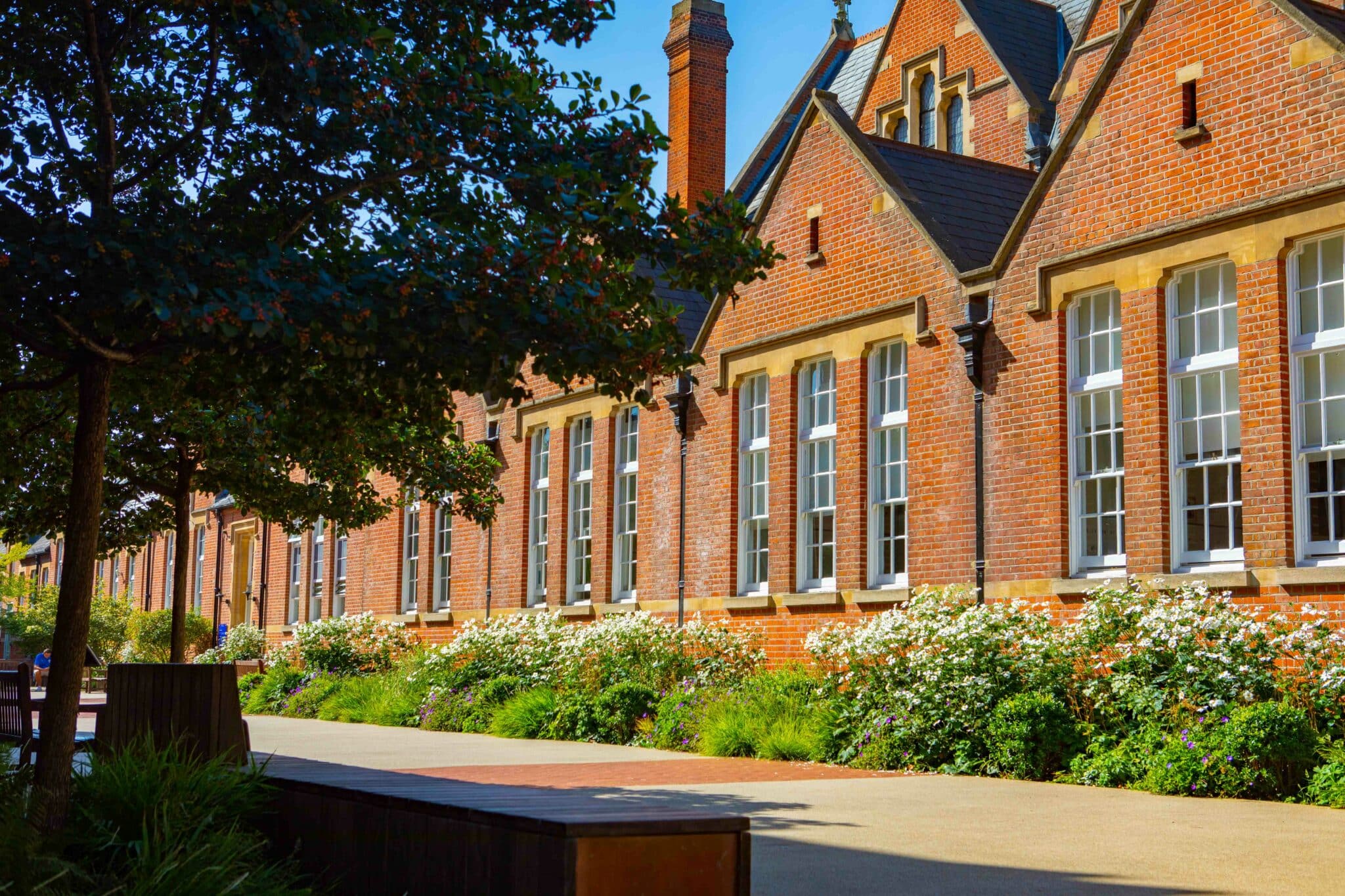
Latymer Upper School is one of London’s leading private day schools for boys and girls aged 7–18. It combines high-quality academic provision with a broad co-curricular programme, including music, drama, sport and the arts, and fosters a well-rounded, socially aware community.
In 2025, a record-breaking 95% of A-level results were A*-B, and 84% of sixth-formers who applied to university were accepted onto their first-choice course.
Latymer Upper School fees
The 2025-2026 fees for Latymer Upper School are £10,365 per term. Bursaries are available at the main entry points of 11+ and 16+ covering between 25% to 100% of fees.
Music scholarships are available at 11+ entry. These can be offered as a discount off fees or as a one-time award.
Take control of your child’s independent school prep.
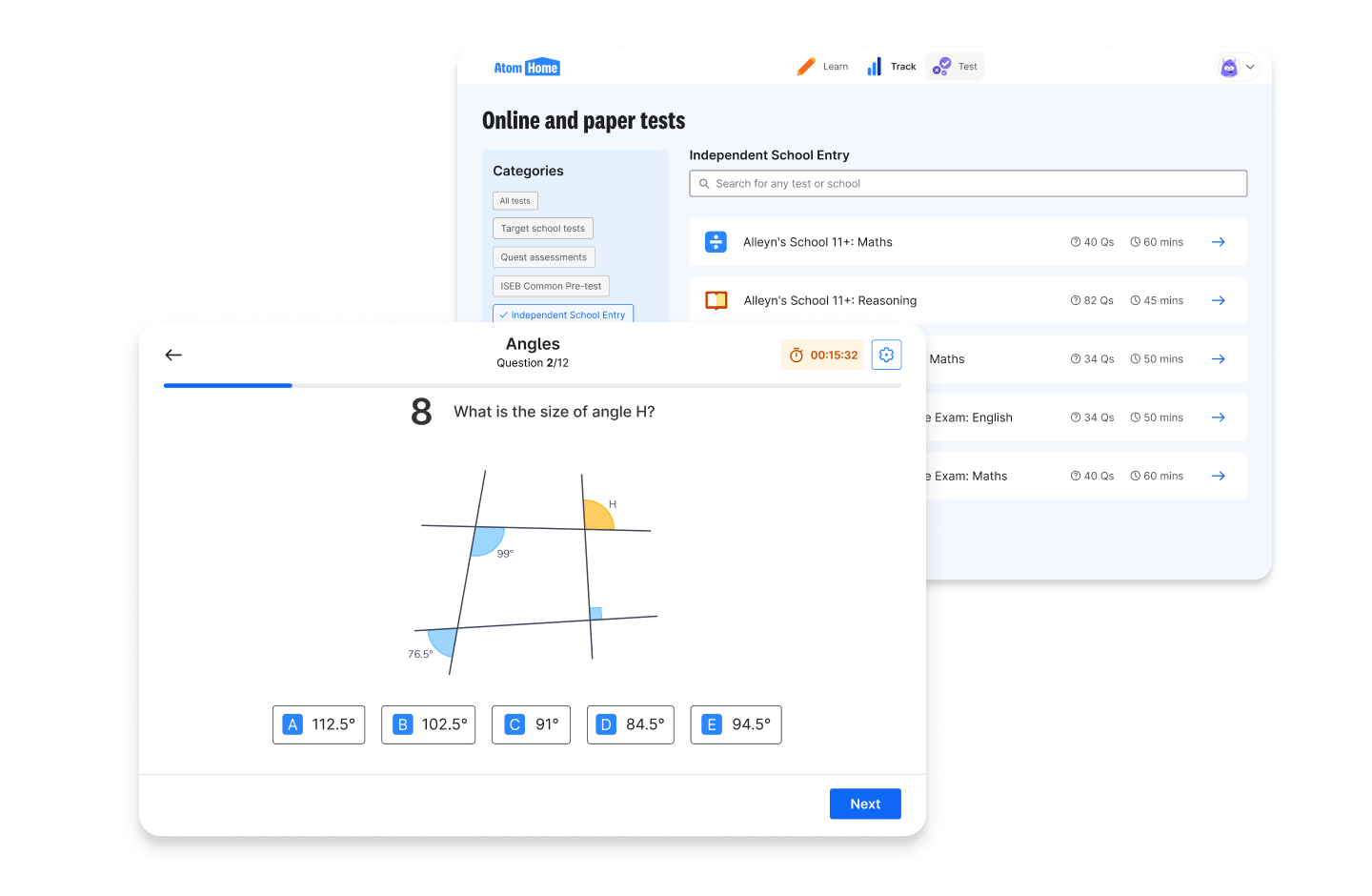
Worried about keeping pace with the competition? Independent school exams can feel unpredictable, but your child’s preparation doesn’t have to be. Atom shows you exactly what to practise and how they’re performing, so you can stay ahead throughout the admissions process.
- Follow personalised weekly exam plans that show them what to learn next.
- Practise with mock tests that replicate their exam and generate new questions every time, so they build real exam skills.
- Track progress and see how they compare to others preparing for the same schools.
Start your free trial and help your child get ready for senior school entry.

